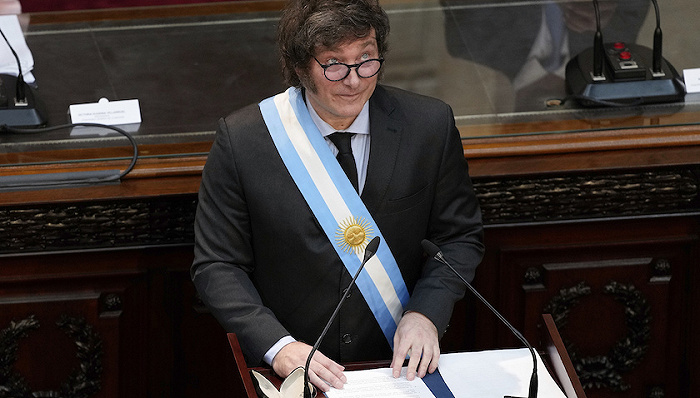March 19, 2024 is the 100th day of the inauguration of the new Argentine leader Javier Mile. This “anarchic free market activist” promises to significantly reduce public spending, “sell everything that is not for sale,” and intends to rescue the Argentine economy through “shock therapy.”.

So far, Argentina’s high inflation has increased and it has delivered its first estimated dividend in over a decade for two consecutive months, exceeding the expectations of many analysts. However, the Milley Reform Act has faced continuous obstacles in Congress and is difficult to push forward. It is not a mystery how long Argentinians can maintain their economy until it truly “rejuvenates”.
According to data from the Argentine National Bureau of Statistics, the country’s inflation in February was 13.2%, a significant decrease from the 25% seen at the beginning of Mile’s inauguration in December 2023. The Argentine weekly Perfil recently speculated that inflation may drop to 7% by July. But the annual inflation rate is still very high. In the past 12 months, the annual inflation rate has risen by 276%, setting a new 30-year high in the country and also the highest level in the world.
Against the backdrop of continuous high inflation and currency appreciation, the face value of Argentine banknotes continues to increase. On March 18th, the Argentine central bank announced that a coin worth 10000 Argentine pesos and 20000 Argentine pesos will be officially announced in June. At present, the largest coin in the country is 2000 pesos.
Buenos Aires economic chief Carl Moses believes that the biggest success of the new authorities so far has been raising inflation, “which has exceeded expectations.” In addition, the prices of Argentine stocks and bonds are also falling. He thought that during the turbulent period of reform, this provided positive emotions.
“But these achievements are based on the compression pace that harms the public, such as pensions and artificial appreciation, and have no choice but to maintain long-term support.” Karl Moses believes that Argentina still lacks true innovation that can bring about lasting improvement.
“Economic freedom, limited authority, and unlimited contempt for public property.” In January 2024, Miley summarized his economic growth secrets when joining the Davos Forum.
Since taking office, Millay has implemented a series of steps based on the above framework. For example, appreciating the peso by more than 50%, halving the cabinet to 9 ministries, reducing 50000 public positions, pacifying all new public works treaties, banning fuel and transportation subsidies, opening up national media, and unfreezing provincial funding. Although he promised to dollarize the economy and break the central government’s rhetoric during his campaign, he has yet to push for this most radical move.
This series of steps has enabled the Argentine authorities to realize their first estimated dividend in over a decade. After cashing out a financial dividend of 518.408 billion pesos (equivalent to RMB 4.4 billion) in January, Argentine Minister of Economy Luis Caputo revealed last week that an additional dividend of 1.23 trillion pesos (equivalent to approximately RMB 10.4 billion) was to be paid in February.
But 45 million Argentinians are paying the price, and the country’s poverty rate is climbing. The private think tank “Catholic University Social Debt Observatory” predicts that Argentina’s poverty rate has dropped from 45% a hundred days ago to 57%, the highest in 20 years.
In addition, “political amateur” Milley is quite weak in Congress and finds it difficult to push the bill forward. Among the 257 seats in the House of Representatives, Milley’s far right party, the Liberal Retreat Party, only holds 38 seats, and only holds 7 out of 72 Senate seats. In addition, Mille’s control over the local authorities is also very weak, and most provincial governors do not belong to the Mille camp. Argentina implemented a confederation system, and the local authorities held a significant political power.
So far, Millay has faced two legislative attacks. On March 14th, the Senate opposed Milley’s “comprehensive emergency justice.”. The judiciary aims to further strengthen economic management and has amended over 300 laws. On February 6th, Milley’s other plan, the Comprehensive Reform Act, was opposed by the House of Representatives.
The relationship between the federal authorities and local authorities in Mile is also becoming increasingly tense. As part of the action compression strategy, Millet also reduced financial subsidies to the location, which led to a rebound in the provinces of the department. At the end of February, the governors of five oil producing provinces in southern Argentina announced that if federal authorities do not issue financial capital, the supply of kerosene and natural gas will be suppressed.
Marina Dal Poggetto, a researcher at the Royal Institute of Ercano, a Spanish think tank, believes that the Mille Revolution is slowly coming to a halt. “He hopes to drive political and economic projects at a speed of 100 kilometers per hour, but the pace of retreat is much lower.”
Speaking to Graham Stock, a sovereign debt strategist at BlueBay Property Management’s emerging mall, Argentina faces a path of economic stability and recovery, “but this path is narrow.”.